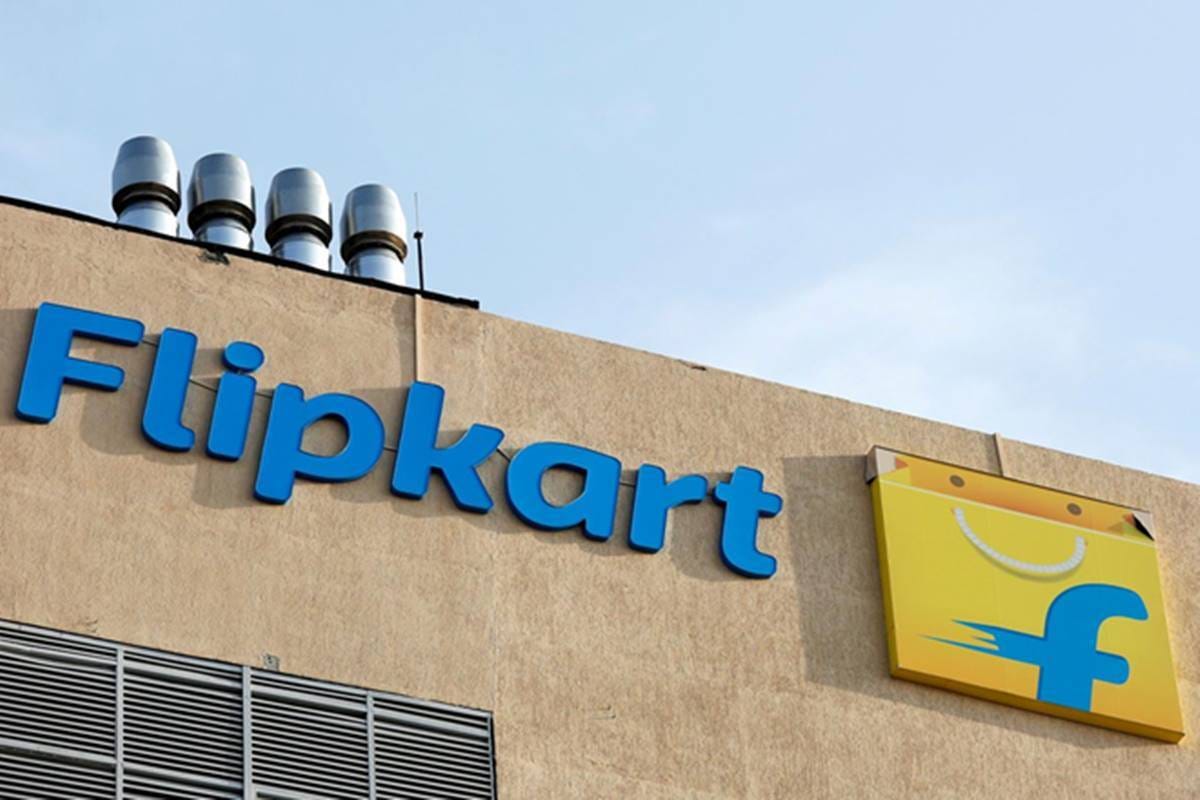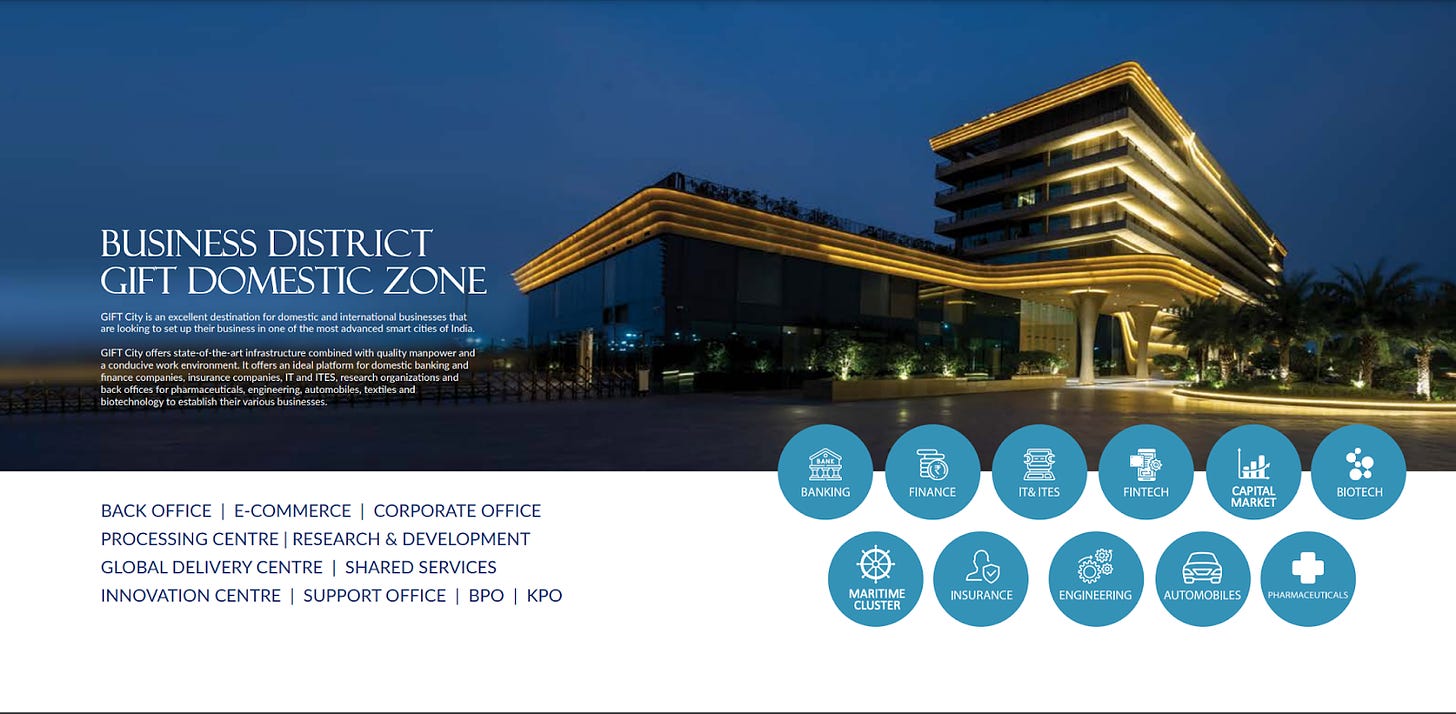The International Financial Services Centre hiding in plain sight
India throws its hat in the ring of global finance
When it comes to the world's top financial centres, one thing is for sure: they know how to mix business with pleasure. From Hong Kong's bustling Wan Chai district, where the cocktails are dark and mysterious, to the iconic Long Bar in Singapore, where the Singapore Sling reigns supreme, there's no shortage of top-notch mixology for the thirsty banker.
And let's not forget about Tokyo's Shibuya district, where the controlled chaos of the city's neon-lit streets is the perfect backdrop for a night out on the town. From cosy whiskey bars like Zoetrope to trendy cocktail spots like Gen Yamamoto, there's no shortage of options for those in search of a great drink.
But what about the newest player on the scene? The Gujarat International Financial-Tec City (GIFT) in India is a cutting-edge financial centre that's breaking new ground in the industry. The only catch? It's currently dry, as the predominantly Hindu state of Gujarat doesn't widely accept alcohol consumption.
Don't worry, though – if you're in need of a stiff drink, Mumbai's rooftop bars are just an hour away. With its lively bar scene and stunning views, the city is a mecca for cocktail enthusiasts, offering everything from classic gin and tonics at The Bombay Canteen to experimental mixology at The Bar Stock Exchange.
Why does India need an International Financial Services Centre?
India is the world’s fifth-largest economy with a GDP of approximately $3.2tn. Despite its growing economic and political heft, it’s relatively absent in international financial flows. Gujarat International Financial Tec-City (GIFT City) – set up in 2015 as India’s first International Financial Services Centre (IFSC) was established with the mandate of bringing growing India’s financial relationships with the rest of the world through a world-class regulatory environment that could rival leading IFSCs such as Singapore, Dubai, or London.
After a thorough analysis of the outflow of talent and capital to more superior financial jurisdictions such as Dubai or Singapore, the Indian government reached a definitive conclusion. As it turns out, many Indian startups are opting to incorporate their operations in Singapore or Dubai, relegating their Indian entities as mere cost centres in the pursuit of greater tax efficiency and better ease of doing business. This approach also allows them to efficiently manage their treasury in currencies other than the rupee. With these trends, it's not hard to see why the Indian government is eager to establish its very own international financial centre in the form of the Gujarat International Financial-Tec City (GIFT).
Flipkart, one of India’s preeminent tech unicorns incorporate in Singapore, with its subsidiaries registered in India (Flipkart India, Ekart and WS retail) drives this point home. In Flipkart’s case, capital controls, the restriction of certain kinds of imports, and the prohibition of the export of certain products made it considerably simpler to register in Singapore. Other Indian start-ups (especially those in IT, gaming, social media and mobile technology) seeking foreign investments have adopted a similar structure and have domiciled in Singapore.
The Singapore FDI route is now so well-developed that most experienced venture capital firms and private equity groups prefer the Singapore route when investing in Indian startups. This structure enables these firms to legally avoid paying India’s capital gains taxes in case of an exit and reduces taxes on profits in case those are paid as dividends. This fiscal leakage prevents India from benefiting from its entrepreneurs due to its inherited socialist tendencies. GIFT aims to provide both Indian and foreign entrepreneurs doing business in India with a world-class pro-business jurisdiction that can easily integrate with the Indian regulatory system.
Elements of an IFSC
IFSCs are complex beasts that have several prerequisites. Let’s examine them briefly:
A Broad Talent Market: GIFT wants to serve high and low-value services in the IFSC ecosystem. On one hand, GIFT wants to cater to FinTech innovation, financial engineering, and other kinds of sophisticated financial skulduggery. On the other hand, it wants to continue catering to the lower end of the skills spectrum such as business process outsourcing (BPO) and customer support offices. India has long been the world’s back office and has vaulted itself into higher-value R&D and financial engineering over the past decade. Given the proximity of Ahmedabad (the prosperous capital of the state of Gujarat) and Mumbai, the supercluster of these cities should adequately service the personnel needs of GIFT. Furthermore, with excellent demographics, increasing prosperity and higher college and university enrollment rates, the talent market should be sufficiently broad and deep to fuel growth for the mid to long term.
Effective, Business-Friendly Taxation and Legal Framework: In the Indian context, this is the trickiest part to get right. India ranks poorly in areas such as contract enforcement, ease of doing business, and petty corruption. The greenfield nature of the GIFT project allows India to get these things right while creating enough of a reputational distance between the offshore jurisdiction of GIFT and the Indian hinterland. The offshore status of this city provides the ability to perform international arbitration procedures within its boundaries. The proliferation of digital governance tools, the simplification of various tax and legal codes, and the increased state capacity have vastly improved the Indian business climate. However, challenges remain. Building a reputation for transparency and excellence takes time, but the future looks bright.
Technological Innovation: The greenfield nature of GIFT allows the financial institutions operating within its borders to leapfrog older processes and technologies and operate at the cutting edge of technology. Advancements in KYC/AML procedures and even blockchain technologies can be tested within GIFT before rolling them out to India and beyond. We’re seeing several experiments in shorter settlement times and real-time transfers that indicate that GIFT is well on its way when it comes to technological innovation.
Global Connectivity: The Gujarat International Financial-Tec City (GIFT) is located just a 40-minute drive from Ahmedabad, a medium-sized international airport with nonstop flights to major global destinations like London, Dubai, and Singapore. As more businesses register in GIFT, business travel is expected to increase, necessitating an expansion in airport capacity and an increase in the number of seats from other International Financial Service Centers (IFSCs) such as London or Dubai to Ahmedabad.
To strengthen and expand India's global reach, the country is working to privatize its national carrier, Air India, and improve and expand its airports. Air India's massive order of 470 aircraft from Boeing and Airbus demonstrates the airline's global ambitions [5]. The presence of an international airport and an Indian international airline will make it easier to add more direct flights to destinations around the world, while several daily nonstop flights to Mumbai, Bangalore, and Delhi provide mobility options within India. Despite the dip in traffic during the COVID-19 pandemic, the Ahmedabad airport's traffic has been steadily increasing.
Traction
So how has GIFT been doing? What started as a trickle has started growing into a steady stream of international banks and financial institutions setting up in GIFT. At the time of writing, MUFG, Standard Chartered Bank, HSBC, Citibank NA, Barclays Bank, Deutsche Bank, and JPMorgan have set up international banking units at GIFT [1].
GIFT is also home to several exchanges such as the National Stock Exchange (NSE), The Bombay Stock Exchange (BSE), and the new kid on the block - the India International Bullion Exchange (IIBX). The last one is particularly interesting, given that India is the world’s second-largest importer of gold and India’s aspiration of playing a more significant role in the global bullion market. IIBX has been conceptualised to provide a gateway to import bullion into India and provide a sophisticated bullion exchange ecosystem to promote bullion trading, investment in bullion financial products and vaulting facilities in IFSCs [2].
GIFT provides a variety of benefits to both Indian businesses to transact overseas with looser capital and currency controls, as well as international businesses looking to do business in India or even businesses looking to use GIFT as a hub to transact between third countries. GIFT also provides the ability for foreign businesses to receive approvals from different departments of the Indian state using a single “window” or application portal. This simplifies the process and reduces the infamous red tape that India was known for regarding business regulation.
One of the benefits of GIFT that immediately stands out is that it’s a great fit for businesses that need to maintain treasuries or investments in a tax-friendly jurisdiction and occasionally “onshore” capital to India. In addition to the business-friendly environment, GIFT boasts better infrastructure, luxury hotels, and all the other modern amenities any financial centre should have.
The trickle of other interesting businesses such as aircraft leasing companies, foreign universities, and insurance companies show that the Indian government’s carrots are working, with both domestic and international companies setting up shop in GIFT. As of December 2022, As of date, there are 142 SEZ units which are operational and international exchanges dealing with an average turnover of $4 billion daily. Banking businesses in IFSC amount to $28 billion as of 2020 and insurance businesses up to $30 billion.
According to the Global Financial Centres Index (GFCI), GIFT has been steadily moving up the rankings. This index has been released by a think tank based out of London since 2007 and relies on survey data and financial reports from the finance industry [6].
The table below shows how GIFT stacks up against the other financial centres surveyed in Asia. GIFT has ascended by 8 ranks in the 2023 survey, a good indicator of its place among Asia’s larger, well-established financial centres.
Gradually, then Suddenly
When it comes to immigrant founders of unicorn technology companies in the US, India tops the list with a total of 90, according to recent data. Israel and Canada follow closely behind with 52 and 42, respectively. It's worth noting that this number only includes unicorn companies, and there are many more Indian founders and operators running smaller technology companies in the US.
In the world of technology startups, Silicon Valley Bank (SVB) is the go-to lender for many entrepreneurs. SVB is known for being conversant with the financial needs and corporate structures of startups, making them an ideal choice for founders looking for banking services. Whether a startup is looking for a loan, a line of credit, or other financial services, SVB has the expertise and experience to help them navigate the complex financial landscape of the tech industry.
With the recent bank run on SVB, GIFT was able to seize the moment and encourage several startups with Indian founders to deposit their funds in GIFT banks. About $200 million of the $1 billion funds held by Indian startups in Silicon Valley Bank (SVB) were transferred to GIFT City, Rajeev Chandrasekhar, minister of state for electronics and information technology, said in an interview [3]. The willingness of the Indian authorities to boldly throw their hat in the ring of global finance, and their business-friendly signalling reflects a major shift in the mindset of the Indian government, one that parallels Deng Xiaoping’s early reform period, when the great opening of the middle kingdom brought greater prosperity and integration with the global economy.
In the spirit of striking while the iron is hot, JPMorgan announced that it will pilot dollar blockchain accounts in GIFT to support 24/7 settlements [4]. The Indian government has announced its plans to triple the size of the city, from 4 (twice the size of Monaco) square kilometres to 13 square kilometres (6 times the size of Monaco). GIFT finally has the momentum it needs to get off the ground and we’ll be watching it carefully.
GIFT might not be serving Martinis yet, but it certainly has the wind in its sails.
References:











